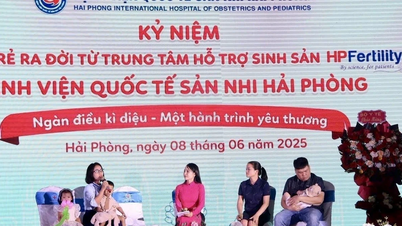In this context, health experts warn of the serious impact of sugary drinks, one of the main causes of increasing rates of obesity, diabetes, cardiovascular disease and many other chronic diseases.
Alarming burden of non-communicable diseases in Vietnam
According to national surveys, Vietnam is witnessing a rapid increase in non-communicable diseases (NCDs), especially hypertension, cardiovascular disease, diabetes, cancer and childhood overweight and obesity. Recent statistics clearly reflect the increasing burden of this group of diseases on public health and the healthcare system.
Dr. Angela Pratt, WHO Representative in Vietnam, talks with reporters. |
The rate of adults with high blood pressure in Vietnam has been increasing sharply over the past decade. Specifically, in 2010, this rate was 15.3%, increased to 18.9% in 2015 and reached 26.2% in 2021. It is estimated that there are currently about 17 million Vietnamese people living with high blood pressure. This is one of the main risk factors leading to serious cardiovascular complications, while also putting great pressure on the health care system.
At the same time, cardiovascular disease continues to be the leading cause of death in Vietnam. In 2021, the country recorded about 287,200 deaths from cardiovascular disease, accounting for 39.5% of total deaths.
In this group, cerebrovascular disease and ischemic heart disease were the two main causes, accounting for 21.9% and 12.6% of all-cause deaths, respectively. These figures demonstrate the need for effective control of cardiovascular risk factors in the community.
In addition, diabetes is also increasing rapidly. According to the 2021 non-communicable disease risk factors survey report, the prevalence of diabetes in Vietnamese adults increased from 2.2% in 2010 to 7.06% in 2021, equivalent to about 4.6 million people living with the disease.
Diabetes not only seriously affects the quality of life but also increases the risk of other diseases such as cardiovascular disease, kidney failure and stroke.
Cancer is also a major concern. Vietnam records about 180,480 new cancer cases and 120,184 cancer deaths each year.
Compared to 2000, the number of new cases increased 2.6 times in 2022. In addition, the number of current cancer cases in the past 5 years is estimated to reach 409,144 cases, showing that the proportion of people living with cancer is increasing. This is a major health burden that requires more comprehensive prevention and treatment strategies.
In particular, overweight and obesity in Vietnamese children has increased rapidly over the past decade and become a serious public health problem.
In the group of children aged 5 to 19 years, the rate of overweight and obesity increased from 8.5% in 2010 to 19% in 2020. Urban areas recorded the highest rate (26.8%), followed by rural areas (18.3%) and mountainous areas (6.9%). For children under 5 years old, the national overweight and obesity rate reached 9.4%, of which urban areas were 11.4% and rural areas were 8.5%. Particularly in the group of children aged 5 to 16 years old, the national overweight and obesity rate was 22%, showing the prevalence and far-reaching impact of this problem.
According to the World Health Organization (WHO), the four main risk factors leading to non-communicable diseases, including cancer, cardiovascular disease and diabetes, are: tobacco use, harmful alcohol consumption, unhealthy diet and lack of physical activity.
The increased consumption of products high in sugar, especially sugar-sweetened beverages, is considered one of the important causes contributing to the increase in these risk factors.
Given the alarming public health situation, strong interventions, including tax policies on harmful products such as sugary soft drinks, need to be implemented sooner and more decisively. Only by focusing on controlling risk factors can we reduce the burden of disease and move towards a healthy, sustainable community.
Can't be slower
It is an undeniable fact that sugary soft drinks cause many consequences for public health, and speeding up the roadmap for imposing special consumption tax is necessary.
Delegate Le Hoang Anh ( Gia Lai delegation) emphasized the importance of building a progressive tax policy, focusing on human health, especially future generations. He said that the tax rate of 8 - 10% expected to be applied in the period of 2027 - 2028 is too low and slow compared to the level of risk that the community is facing.
Delegates cited that Vietnam is suffering a heavy burden from non-communicable diseases, including more than 21 million people with cardiovascular disease, more than 5 million people with diabetes, and a very high rate of overweight and obesity in urban children.
He also warned that sugary beverage consumption is skyrocketing, from 1.59 billion liters in 2009 to 6.67 billion liters in 2023, an increase of 420%. “The average consumption per Vietnamese person is now double the WHO recommendation to ensure health,” said delegate Hoang Anh.
The National Assembly delegate from Gia Lai province said that this is not only a tax issue but also a “national strategic choice” regarding the responsibility to protect public health and promote sustainable development. He proposed to keep the tax rate at 10% from 2026 and increase it to 20% in 2030, while applying an absolute tax based on sugar content like Thailand’s model.
He emphasized that the tax policy is not intended to prohibit but to motivate consumers to choose healthier products, contributing to reducing future illnesses and medical costs. Finally, he called on the National Assembly to act immediately to protect people's health, instead of delaying, leading to serious consequences in terms of medical costs and loss of human resources.
Sharing the same view, Dr. Angela Pratt, WHO Representative in Vietnam, emphasized that sugary drinks not only contribute to weight gain and obesity but also increase the risk of dangerous non-communicable diseases such as type 2 diabetes, cardiovascular disease, stroke and some types of cancer. On average, each Vietnamese person consumes nearly 70 liters of sugary drinks per year, equivalent to 1.3 liters per week, four times higher than in 2009.
Faced with this situation, WHO recommends that Vietnam quickly adopt strong preventive measures, of which taxing consumption on sugary drinks is considered one of the top priority solutions. According to WHO, this measure not only helps increase product prices and reduce consumption, but also changes eating habits, especially among children and adolescents - a group vulnerable to price fluctuations.
Currently, about 110 countries around the world have implemented taxes on sugary drinks, with positive results in reducing consumption, improving public health and increasing government revenues. In addition, WHO also encourages raising public awareness about the sugar levels in popular products, helping consumers make more rational choices.
The application of excise tax on sugary drinks in Vietnam is being considered within the framework of the amendment of the Law on Excise Tax. WHO considers this to be a very appropriate time to implement this measure, in order to prevent the increasing consumption of sugary drinks and the negative consequences that come with it.
Notably, WHO also warned of opposition from some industries, arguing that the tax would have negative economic impacts. However, global studies have shown that when the tax is imposed, consumers will switch to choosing products with less or no sugar, and manufacturers will adjust their products to better suit market demand.
In addition, WHO welcomes the new policy of the Vietnamese Ministry of Health towards free annual health check-ups for people by 2030.
Accordingly, a portion of revenue from taxes on tobacco, alcohol and sugary drinks can be earmarked to fund this program, contributing to early detection of diseases, reducing treatment costs and improving public health. However, WHO also noted that policymakers need to carefully consider earmarking this revenue source to ensure flexibility and efficiency in budget management.
The WHO Representative in Vietnam also cited Conclusion No. 176 of General Secretary To Lam dated April 25, 2025, emphasizing the important role of disease prevention, chronic disease management and building a healthy lifestyle, including limiting the use of sugary drinks, alcohol and tobacco, to reduce the burden of non-communicable diseases in Vietnam.
In the context of the increasing burden of non-communicable diseases, imposing excise tax on sugary drinks is not only an economic policy, but also a public health responsibility. This is a necessary step that cannot be delayed, aiming to orient healthy consumption, reduce diseases and protect the future of the younger generation.
Source: https://baodautu.vn/thue-tieu-thu-dac-biet-voi-do-uong-co-duong-loi-ich-lon-tu-mot-thay-doi-nho-d295745.html
























































































![[OCOP REVIEW] Tu Duyen Syrup - The essence of herbs from the mountains and forests of Nhu Thanh](https://vphoto.vietnam.vn/thumb/402x226/vietnam/resource/IMAGE/2025/6/5/58ca32fce4ec44039e444fbfae7e75ec)







Comment (0)